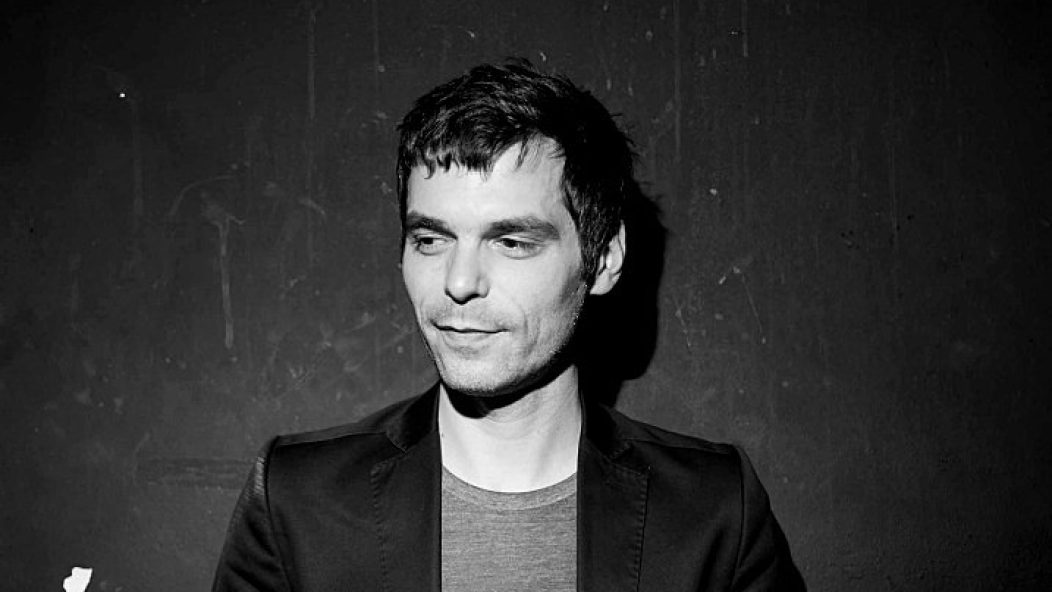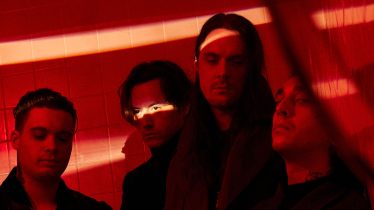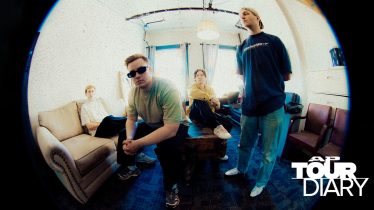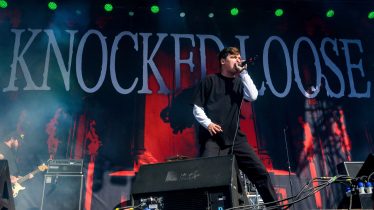
‘I had to get this as perfect as possible’—Q&A with ex-Texas Is The Reason frontman Garrett Klahn
Next week, Garrett Klahn will release his debut solo album and, without question, it’s his best work since coming to prominence with beloved post-hardcore pioneers Texas Is The Reason in the mid-’90s. Filled with heartbreaking acoustic ballads and warm, Sunday morning comedowns, it’s the sound of a grizzled punk vet who can easily recite the track listings of, say, All Things Must Pass, Harvest, Definitely Maybe and Heartbreaker all without using his iPhone.
But perhaps more accurately, Klahn’s eponymous first solo effort sounds a hell of a lot like him, which is a compliment he has gotten more than once lately. “I’ve actually heard that from a few people, and it warms my cold, dead heart,” Klahn says laughing, when AP reaches him at his mother’s house in Buffalo, New York, where he is visiting for the holidays. “This album really does feel like a combination of everything I have ever been interested in. It felt like I built something that resembles me.”
Though Klahn may always be most recognized for his work with Texas Is The Reason, this album also is the culmination of nearly 20 years of ups and downs for the enduring songwriter. So on the eve of its release, AP looked back with Klahn, digging into the genesis of his solo debut while also retracing his time in lesser-known acts like The New Rising Sons, Solea and Atlantic/Pacific. “I have never taken any of this for granted, never once,” Klahn says, when looking back on his rather lengthy career. “I just want to do as much as I can, while I can.”
INTERVIEW: Trevor Kelley
There aren’t a lot of debut solo albums that happen 20 years into an artist’s career.
[Laughs.] That’s a good point.
So why did you decide to release a solo album now?
Well, the idea of a solo record has been floating around for a while. Some of these songs are over 10 years old. They’re songs that I have held back from multiple bands because I thought, way deep down, that I might do something on my own. But with all of that said, this is still probably the most collaborative thing I have ever done. There’s upwards of, like, eight people playing on the record.
Who are those collaborators and where did you find them?
There’s really two camps: The East Coast camp and the West Coast camp. The East Coast camp, that’s all people from Buffalo. Those are people who I have known for over half of my life. Then there’s the West Coast camp. Those are people I connected with on the road over the years. [Many of them play in the Los Angeles indie rock band Goldenboy—ed.] They were in it as much as I was. It was a lot more involved than everybody thought. This record took over a lot of people’s lives. As much as it could, it kind of devoured everybody.
I don’t think a lot of people know the history leading up to this record. There isn’t a great document of what happened to Garrett Klahn between the years 1997 to 2016.
Yeah, that’s fair. [Laughs.]
So let’s go back a little. It's the winter of 1997 and Texas Is The Reason has just broken up. Where are you at that point?
Well, in 1997 I was living in Queens with Drew Thomas from Into Another. We didn’t really know each other back in the day. I knew him in passing, just from going to shows. But he and I made a pretty strong connection once we met in 1997. So once both [Texas and Into Another] called it a day we met a guy named Kevin McGuiness, who is a really brilliant songwriter from Queens, and the idea for the New Rising Sons [was born].
At the tail end of Texas Is The Reason literally every major label in the world was trying to sign you. That pattern then repeated itself with the New Rising Sons. You were together for just a few months before you ended up signing with Virgin. What effect do you think that had on you guys?
As far as the experience goes, nothing really changed. I guess I got to see the inter-workings of “the machine” with Virgin, but it was at such a low level. I mean, our record was up against the new Janet Jackson and the new Lenny Kravitz. [Laughs.] There was really no way to compare it.
Sure, but at the same time you guys recorded your debut album with Luther Vandross’ backup singers and then went on tour with Iggy Pop. That was a pretty different reality from where Texas was coming from.
Yeah, for someone from our world I imagine it was, like, the beginning of “the big leagues.” It was real tours, real backing. But even after all of that they still spent over $100,000 on our album and said, “Eh, no thanks” and set it aside. It was such a non-issue for them.
When did you know it was time to call it a day with the Sons?
When they shelved the record. [Laughs.] But you know, there was also a lot of outside influences going on. There were a lot of drugs in our scene at that time. It just fizzled out. It was kind of like “living the dream” for all of us. We had the studio in Woodstock and the house and the background singers and the horn section. We just went for it. I knew that option wouldn’t come around again—and I was exactly right.
Shortly thereafter, you formed Solea with Sergie Loobkoff who had traveled a somewhat similar path as you. He also went through the major label ringer with Samiam. Was there a bond that was created between the two of you because of that?
Yeah, definitely. Once The Sons kind of fizzled out, I actually moved back here to Buffalo for a little while. It was cheap to fly from Buffalo to San Francisco, so we started sending each other CDs through the mail. Then I went and stayed with him for two weeks. We just smoked a lot of really great weed and kind of lazily wrote that first Solea record together right there in his house.
It’s 10 years later and I still don’t actually know the answer to this. What happened to Solea?
It was expensive to keep it afloat. Also, it was the climate of the US scene in the early ’00s—we weren’t fitting in here at the time. But God bless ’em, we were doing really well overseas and in Europe. But that made it even more expensive if we wanted to get out there and show our faces. It involved multiple round trip plane tickets and then gas money and hotels. It was tough.
After Solea called it quits, Texas ended up reforming in the fall of 2006 to play two shows at Irving Plaza in New York. When those conversations first began, what were your hopes for getting back together again?
Well, like every time the band has gotten back together I was hoping that it would be for more than two fucking shows. I mean, ask any of them. I am the one who is always like, “Let’s go. The clock is ticking, boys. Let’s go.” But the interest in those first two shows was so overwhelming that I didn’t have any expectations, to be honest. I was just so nervous and excited and fucking frightened to death.
So those two shows at Irving Plaza happen and they immediately sell out—and then there is no new activity with Texas for another six years.
Yeah, it was the same old thing. We didn’t plan anything outside of those two shows. We should have, I think. But we didn’t. So at that point, for the first time, I went to Europe and did the solo acoustic thing and that kind of lead up to Atlantic/Pacific.
How long did that band last for?
Until around 2011—we actually covered a lot of ground. Atlantic/Pacific was kind of my dream band, I think. John [Hurgeth, the band’s co-founder] was such a wizard in the studio and we both had this unquenchable thirst to be in a van, in the middle of nowhere, driving to the next show. We both couldn’t get enough of that life. We managed to keep it afloat for a long time. It was fully funded by us. We had a couple labels involved over the years. But it was a full-on labor of love.
So at the end of Atlantic/Pacific you eventually came back to Texas–again—in 2012, and after years of fronting bands that didn't quite reach the same heights, you were suddenly playing sold out shows in front of 1,500 people. After everything you had been through did it feel like getting your just dues?
The “big boy” aspect of it wasn’t lost on me. It was big clubs and there was all this fanfare attached to it. It was like, “Fuck yeah, dude, it looks like you’re actually doing it now.” [Pauses.] I don’t think it’s ever going to happen again. It was a really intense run. It was a real mix of emotions each night. You can ask anyone, I was a blubbering baby that whole fucking tour. I could barely keep it together.
In The summer of 2013, Texas played their last show together at a club in London. Where was you head at after that show? Did you still want the band to continue?
No, I think it took a while for that feeling to come back. That night in London was just so heavy. It couldn’t have been more fucking dramatic. I think my head would have exploded had it been anymore dramatic. [Laughs.] But after a month or so of just cooling out, yeah, I would have gone right back into the van. No question. I would have done it in a heartbeat. But in hindsight, this record would have never been made had that happened.
When you look back on the last 20 years worth of music you have released, you have always had very strong collaborators. Obviously the earliest example of that is with Norman [Brannon, guitarist for Texas Is The Reason]. But that was also the case with Sergie and Hurgeth.
Right, that’s true.
So when you set out to write this record, was that something you were cognizant of? Was there a feeling of “Well, fuck, this is just me now?”
Yes, the entire time. [Laughs.] I mean, I started this record once and scrapped it. Somewhere out there there’s a version of the album that never got finished. I started it—and then six or seven months later I re-started it.
What went wrong with those first sessions?
I was just in a really dark place. [Pauses.] It just wasn’t happening. I had to get this fucking thing as perfect as possible. For one, I am not going to have another opportunity for a “debut solo record.” But also, like I said, this record took over everybody’s lives. I am not ready to do that again.
Did you always think you'd still be making music at 41?
Fuck, I don’t think I thought past 30. [Laughs.] I knew I wouldn’t be married. I knew I wouldn’t have kids. I am not that type. I have only ever been in a van or in a studio. This is all I have ever really done since I was 16 years old. It’s too late for me to learn anything else, that’s for sure.
When you look around at your friends from this world, though, a lot of them have moved on to something else. They all have children or careers. Is it hard to be the guy that is still out there?
For me, I just don’t think along any other lines—which is either a blessing or a curse. I am always thinking about where I can play next and what song comes next. Anything in between is just a vehicle to get me to that place. I am frightened to death to think about when that isn’t an option anymore. [Pauses.] But thankfully, I think I’ve still got some time left.
Klahn will release his self-titled solo full-length January 15 via Rise Records.







